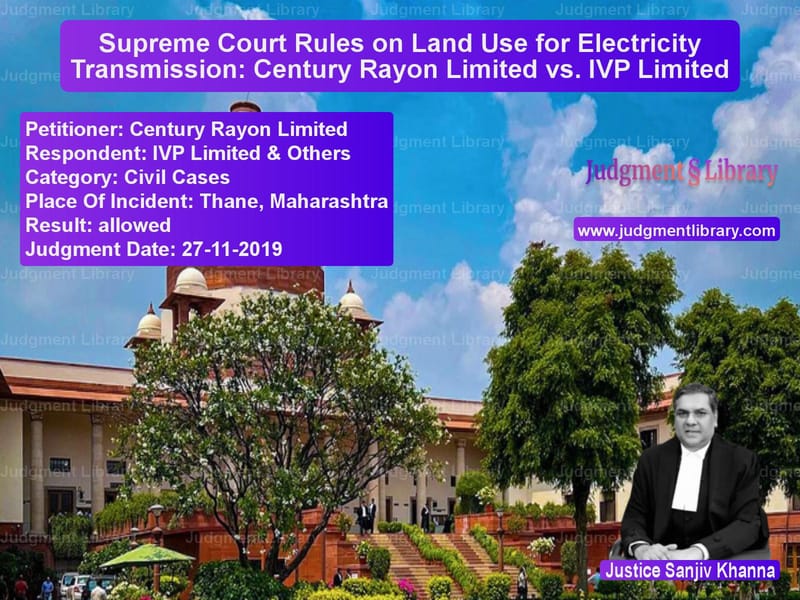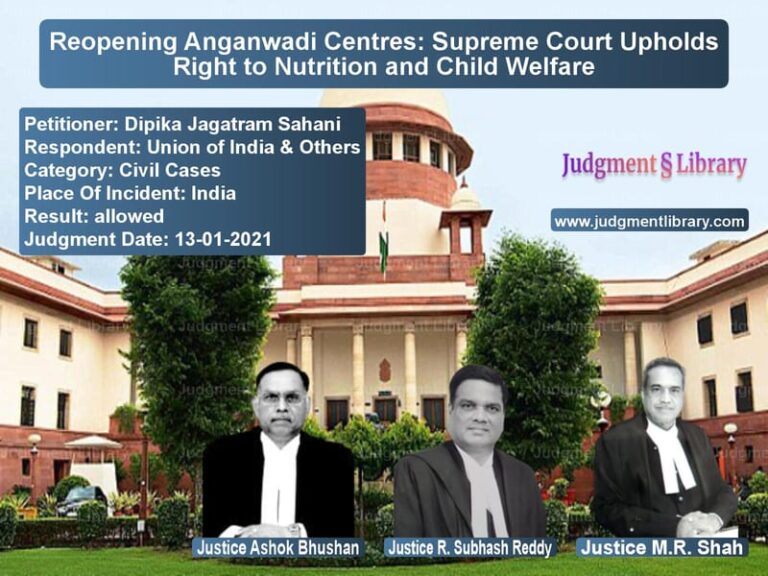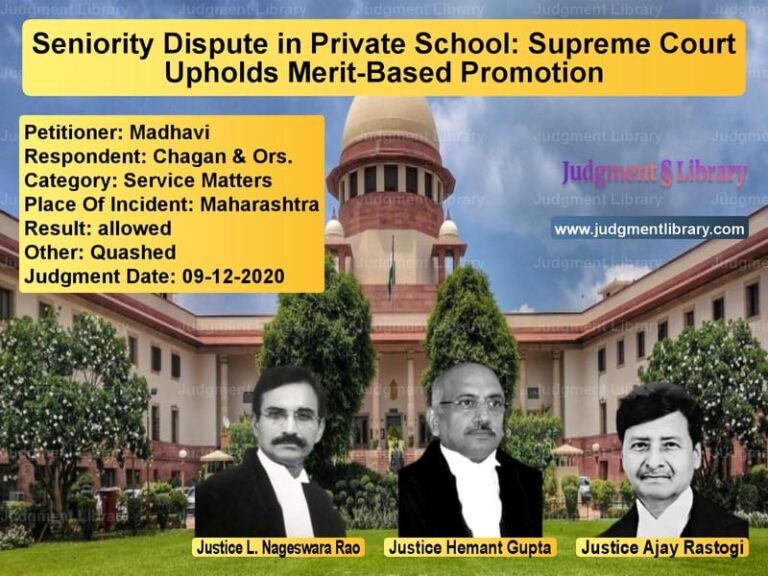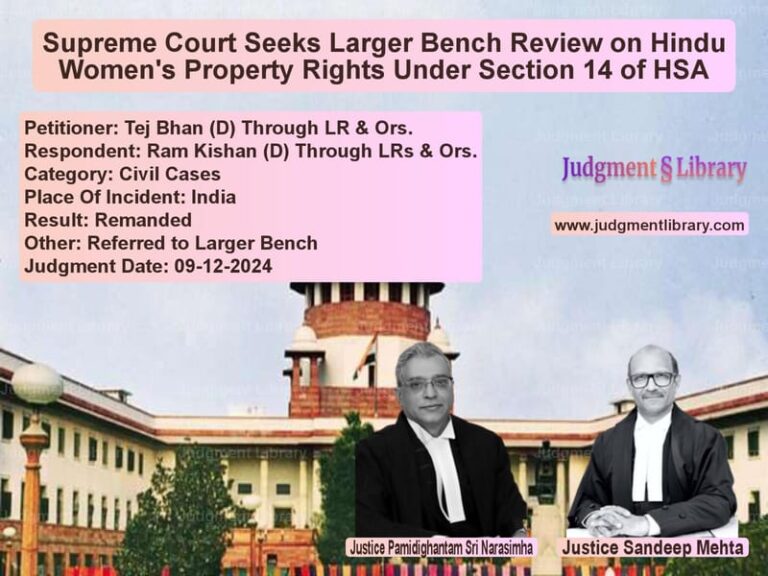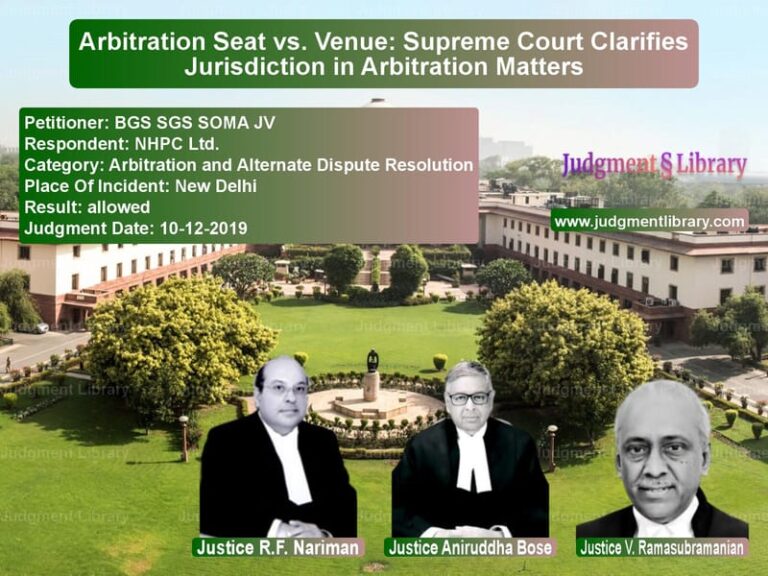Supreme Court Rules on Land Use for Electricity Transmission: Century Rayon Limited vs. IVP Limited
On November 27, 2019, the Supreme Court of India delivered an important ruling in the case of Century Rayon Limited vs. IVP Limited & Others, addressing a dispute over land use for electricity transmission towers. The case revolved around the construction of transmission lines by Maharashtra State Electricity Distribution Company Limited (MSEDC) on land owned by IVP Limited. The Court ruled in favor of Century Rayon Limited, allowing the construction to continue while mandating compensation for the affected landowner.
Background of the Case
The dispute arose when IVP Limited, the owner of land in Vadavali and Mohane villages, filed a suit for a permanent injunction, challenging the excavation and construction of electricity transmission towers on its land. The appellant, Century Rayon Limited, had applied to MSEDC for a Line In Line Out (LILO) transmission line, which was sanctioned by Maharashtra State Electricity Transmission Co. Ltd. (MSETCL) on May 24, 2017, with the condition that any land-related disputes be resolved at the appellant’s cost.
IVP Limited sought legal intervention, arguing that the construction of transmission towers on its land was done without due process and that prior approval was required. The trial court and the first appellate court issued an interim injunction preventing Century Rayon Limited and MSEDC from continuing construction.
Legal Issues
The primary legal questions before the Court included:
- Whether the construction of electricity transmission towers on private land without prior approval was legal.
- Whether the owners of the land were entitled to compensation.
- Whether an interim injunction was justified, considering the progress of the project.
Arguments of the Appellant (Century Rayon Limited)
The appellant argued that:
- The transmission line was necessary for public interest and was sanctioned by the government.
- Under the Indian Telegraph Act, 1885, read with the Electricity Act, 2003, power companies have the authority to use private land for transmission lines, subject to compensation.
- The District Magistrate, Thane, had already granted permission for the project after due consideration.
- Over 80% of the work had been completed, and stopping the project at this stage would cause significant losses.
Arguments of the Respondent (IVP Limited)
The landowner IVP Limited contended that:
- The construction was initiated without obtaining the necessary approvals from the District Magistrate.
- Despite the later approval, the work should not have commenced without resolving the compensation issue.
- The project primarily benefited the appellant rather than the general public.
- Monetary compensation alone was insufficient, and alternative land use should be considered.
Supreme Court’s Observations
The Supreme Court acknowledged that there were lapses in obtaining prior approvals. However, it ruled that:
- The project served a larger public interest and should not be stalled at this stage.
- Section 16 of the Indian Telegraph Act, 1885, allows transmission lines to be constructed on private land, subject to compensation.
- The District Magistrate had already permitted the project, and the respondent could seek compensation through appropriate legal channels.
- Considering the extent of work completed, an interim injunction was not justified.
Final Judgment
The Supreme Court ruled:
“Considering the balance of convenience, the continuation of the transmission project is justified. However, the landowner is entitled to compensation as determined by the District Magistrate, and the appellant must make an additional ad hoc payment of Rs. 20,00,000/-.”
The Court:
- Set aside the interim injunction issued by the lower courts.
- Allowed the construction of electricity transmission towers to continue.
- Ordered Century Rayon Limited to pay Rs. 20 lakh to IVP Limited as an interim compensation, subject to final determination.
- Directed that further disputes be adjudicated under the provisions of the Indian Telegraph Act.
Implications of the Judgment
The ruling has several key implications:
- Reaffirms the authority of power transmission companies under the Indian Telegraph Act.
- Emphasizes that landowners are entitled to fair compensation but cannot block projects in larger public interest.
- Provides clarity on procedures for land use in electricity transmission projects.
- Encourages the resolution of disputes through compensation rather than legal injunctions.
Conclusion
The Supreme Court’s decision in Century Rayon Limited vs. IVP Limited provides clarity on the balance between infrastructure development and property rights. By allowing the continuation of the transmission project while ensuring fair compensation for the landowner, the ruling upholds both economic progress and legal rights.
Petitioner Name: Century Rayon Limited.Respondent Name: IVP Limited & Others.Judgment By: Justice Sanjiv Khanna.Place Of Incident: Thane, Maharashtra.Judgment Date: 27-11-2019.
Don’t miss out on the full details! Download the complete judgment in PDF format below and gain valuable insights instantly!
Download Judgment: Century Rayon Limite vs IVP Limited & Others Supreme Court of India Judgment Dated 27-11-2019.pdf
Direct Downlaod Judgment: Direct downlaod this Judgment
See all petitions in Property Disputes
See all petitions in Landlord-Tenant Disputes
See all petitions in Specific Performance
See all petitions in Judgment by Sanjiv Khanna
See all petitions in allowed
See all petitions in supreme court of India judgments November 2019
See all petitions in 2019 judgments
See all posts in Civil Cases Category
See all allowed petitions in Civil Cases Category
See all Dismissed petitions in Civil Cases Category
See all partially allowed petitions in Civil Cases Category

